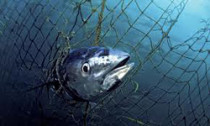
Industrialised fishing operations by boats from countries such as Japan, Korea, China and Taiwan are putting pressure on smaller operations carried out by Pacific Islanders. The Secretariat of the Pacific Community has put out a briefing paper for regional governments on how to handle the issue. Dr Shelton Harley, head of the SPC’s Oceanic Fisheries Programme’s Stock Assessment and Modelling Group tells Bruce Hill Pacific nations need to balance the needs of their local fishermen with the money they get from licensing bigger overseas companies to fish in their economic zones.
Presenter: Bruce Hill
Speaker: Dr Shelton Harley, Secretariat of the Pacific Community
HARLEY: At the end of the day there’s a finite number of fish and so these boats are competing in a way for the same, same stock. There are a few things that are in the advantage of the people on these, the small islands, is that the island itself can act as a fish aggregating device, and so it can keep the fish close to their islands for awhile, so that they’re more accessible to them and less accessible to the industrial fleet. But at the end of the day, most of these tuna fish move quite widely throughout the Western Pacific. They don’t stay there for long. So any fish that you find around your island, at some stage in their life are going to be out in the open ocean, where industrial fishing is occurring.
HILL: Now, these fishing boats, the industrial ones, obviously they pay licence fees to Pacific Island countries to be able to fish in their waters, so Pacific Island governments make a bit of money that way. Is there some way to make sure that we can have the sort of industrial fishing, but also balance that with the needs of the local Pacific Island fishermen as well?
HARLEY: Well, I mean that’s exactly at the heart of this, this issue. For these countries, fisheries is in many cases the largest resource that they’ve got available to them for money and so money for fisheries is used for critical things like education and health care, provides considerable money for the government’s coffers. And so at the same time, you’ve got these small scale fishermen who go out, catch fish, have a livelihood, who have a family to take care of and in some of the rural areas will be providing significant protein to their communities around them. It’s just how do you balance that? It’s certainly not an easy question to answer.
HILL: There have been complaints by some local Pacific Island fishing companies that a lot of these boats from other countries, especially in Asia, are actually subsidised by their government, because they need the protein and they’re saying look, fishing in the Pacific is hardly a level playing field?
HARLEY: The main thing about any sort of financial assistance that fishermen get is that it makes it, they can still go fishing and they can go fishing with they’re being less fish around and that’s one of the problems that you can face in fisheries globally. As long as the economic playing field is level, the fishing fleets will usually end up at a nice safe level, because nobody wants to go out of business. So you need to have plenty of fish in the water, keep your catch rates up. But if you’re getting extra money, if you’re not paying the full cost of your fishing activity, then obviously, you don’t need to catch as much fish to make money, and so that’s a worldwide problem and we definitely heard of concerns in the Pacific from some of our member countries about that issue.
HILL: Is this a problem that Pacific Island countries should be able to tackle on their own or is it more of a regional problem?
HARLEY: The challenges facing the fishermen is a really tricky one and we’ve proposed that they try and address it on a couple of levels, because you can’t just say look, we’re not going to have industrial fishing, because that brings in key money. Countries themselves, what they can do, is they can set limits for their zones and in doing so, they can think about how much fish they want to come out of those waters, compared to maybe what’s been coming out in the past. And one of the really important things though, that’s going on around the region is the idea of an Exclusion Zone, where essentially you’ve got a critical area of where people are living and you say, look industrial fishing, you can’t come any closer than 25 or 60 miles within land. We want to keep this area around here safe. And the other thing that SPC’s been doing with a lot of member countries is putting in these near shore anchored FADS, or Fish Aggregating Devices, small scale rafts and things which anchored to the sea floor, known locations and they help make fish more accessible to the local fishermen as well.
On a regional level though, we do have the Tuna Commission, The Western Central Pacific Fisheries Commission, and as part of its convention, it’s legal underpinning is the requirement to take into account the needs of developing states, in particular, small island developing states. So it says in there that you need to consider communities who are dependent on fish, so the Commission at the regional level, has a responsibility to ensure that there’s enough fish in the water so that there’s enough to go around.











Social Profiles